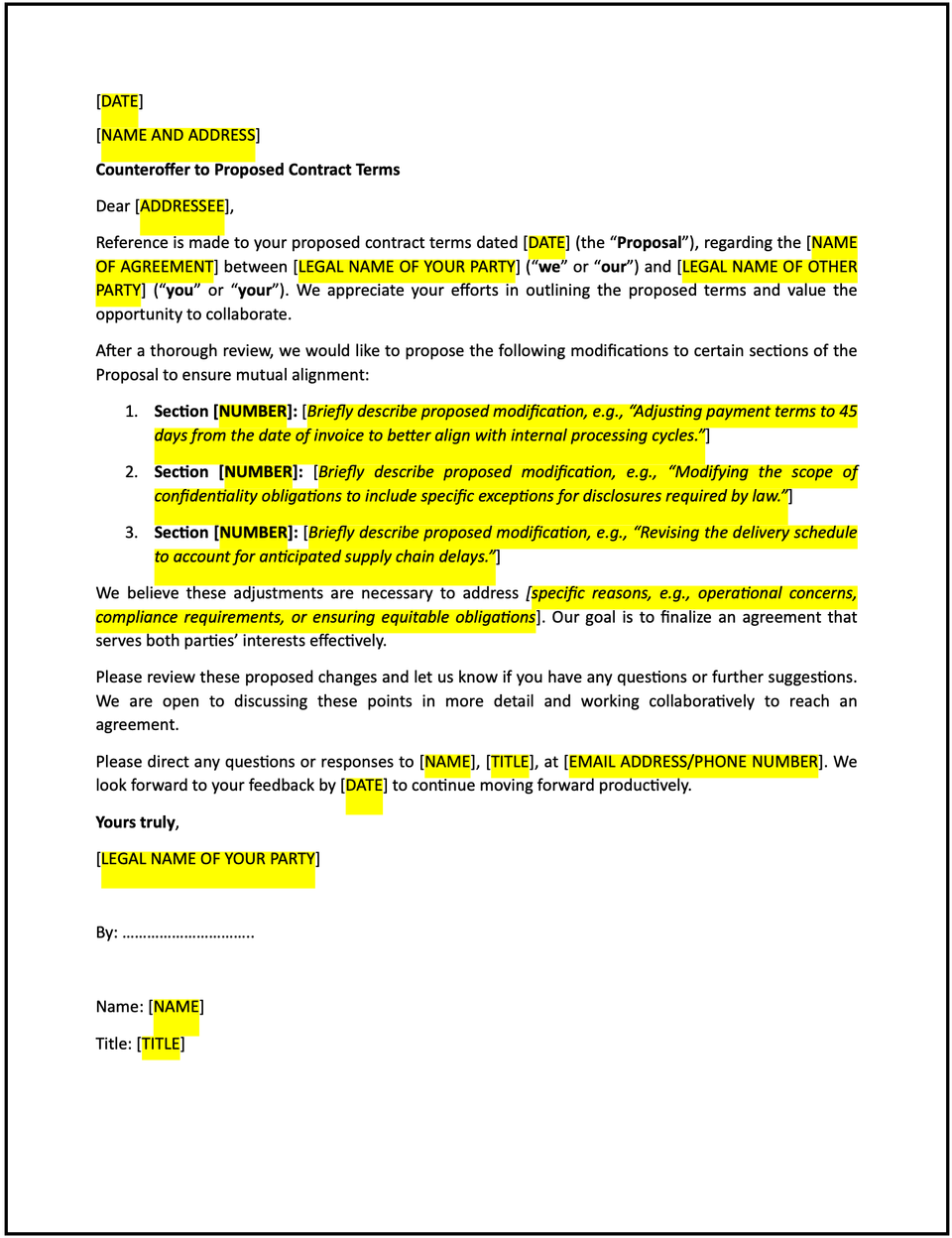Counteroffer to proposed contract terms letter: Free template

Counteroffer to proposed contract terms letter
Negotiating contract terms often requires presenting a counteroffer to align the agreement with your organization’s needs. This letter provides a professional way to propose adjustments to the initial terms, explain your reasoning, and maintain a collaborative tone to foster positive negotiations.
How to use this counteroffer to proposed contract terms letter
- Reference the original proposal: Clearly state the contract proposal you are responding to, including its title, reference number, or date.
- Customize the template: Replace placeholders with your organization’s details, the proposed contract terms, and the adjustments you are suggesting.
- Specify the counteroffer: Clearly outline the terms you propose, including specific changes and any reasoning behind them.
- Explain your reasoning: Provide a clear and concise explanation of why the changes are necessary, focusing on mutual benefits or operational needs.
- Maintain a collaborative tone: Ensure the letter emphasizes a willingness to work together to reach an agreement that suits both parties.
- Include a call for further discussion: Invite the other party to review the counteroffer and schedule a meeting or call to discuss further.
Benefits of using a counteroffer to proposed contract terms letter
This letter template provides a clear and professional way to negotiate contract terms while maintaining a positive and constructive relationship. Here’s how it helps:
- Foster collaboration: The letter frames the counteroffer as part of a constructive dialogue, emphasizing mutual benefits.
- Provide clarity: Clearly outlining the proposed changes ensures the other party understands your position and the reasons behind it.
- Demonstrate professionalism: A well-structured letter reflects respect and a commitment to reaching a fair agreement.
- Simplify negotiations: By presenting specific adjustments in writing, the letter reduces ambiguity and streamlines the negotiation process.
- Strengthen trust: Clearly articulating your needs and willingness to work together builds confidence and supports a positive working relationship.
Tips for writing an effective counteroffer to proposed contract terms letter
- Be specific: Clearly reference the original proposal and state the exact changes you are requesting.
- Justify your changes: Provide a logical and respectful explanation of why the adjustments are needed and how they benefit both parties.
- Use professional language: Maintain a collaborative and respectful tone to keep negotiations positive and constructive.
- Address potential objections: Anticipate and address any concerns the other party might have about the counteroffer.
- Keep it concise: Focus on the key changes and reasoning, avoiding unnecessary details that could detract from the main message.
Frequently asked questions (FAQs)
Q: What details should I include in the counteroffer?
A: Include references to the original proposal, the terms being countered, the proposed changes, and your reasoning.
Q: Should I suggest multiple alternatives?
A: If possible, yes. Offering multiple options shows flexibility and can help facilitate a quicker resolution.
Q: Who typically receives this letter?
A: Send the letter to the other party involved in the negotiation, typically the point of contact or legal representative.
Q: How formal should this letter be?
A: The tone should be professional and collaborative, reflecting your willingness to reach a mutually beneficial agreement.
Q: When should this letter be sent?
A: Send the letter promptly after reviewing the initial proposal to maintain the momentum of the negotiation process.
Q: Can this letter include non-negotiable terms?
A: Yes, if there are terms you cannot adjust, clearly state them and explain why they are critical to your position.
Q: Is this letter suitable for informal negotiations?
A: Yes, even in informal negotiations, a written counteroffer provides clarity and ensures alignment.
This article contains general legal information and does not contain legal advice. Cobrief is not a law firm or a substitute for an attorney or law firm. The law is complex and changes often. For legal advice, please ask a lawyer.


